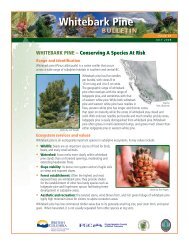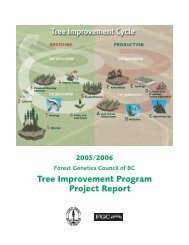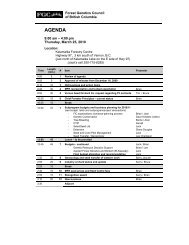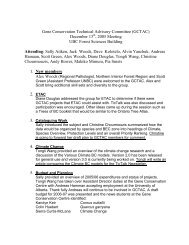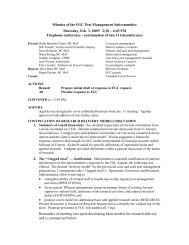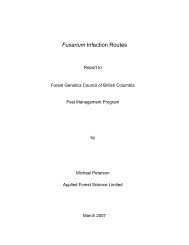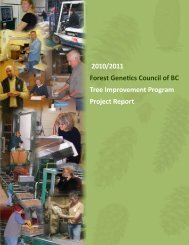Tree Improvement Program Project Report 2006 / 2007
Tree Improvement Program Project Report 2006 / 2007
Tree Improvement Program Project Report 2006 / 2007
You also want an ePaper? Increase the reach of your titles
YUMPU automatically turns print PDFs into web optimized ePapers that Google loves.
ut there was a substantial decrease in potential seedlings.<br />
We found no fungal contamination (Fusarium spp.) or<br />
infection (Caloscypha fulgens) in any of the seed fractions.<br />
The liquid separation was not very efficient because the<br />
poor fraction still germinated at 43 percent, although with<br />
the attempt to remove the chitted seed, we expected that<br />
some germination would occur in the poor fraction. We<br />
don’t consider this effort a success, and future upgrading<br />
efforts with seed lots of similar seed characteristics and<br />
quality are likely to produce similar results.<br />
Portion Volume Pot. <strong>Tree</strong>s D1 GC W1 GC G20 GC<br />
CONTROL 96.0 Kg 6.36 M 67% 50% 39%<br />
Upgraded 80.3 Kg 5.48 M 70% 42% 40%<br />
Poor 15.5 Kg 0.62 M 43% 29% 18%<br />
Table 2 .<br />
.3. Eng neer ng Consultat on<br />
for K ln and/or Controller<br />
Upgrades: <strong>Project</strong> 0 7E27<br />
Dave Kolotelo<br />
The funds for to this project were allocated to two separate<br />
kiln projects:<br />
a) training and upgrades to our ARGUS Control System<br />
b) engineering evaluation of our kiln<br />
With regard to our ARGUS system, we had a meeting<br />
with one of the manufacturer’s technicians/programmers<br />
to better understand the operational complexities of our<br />
kiln programming. We also invested in an upgrade to our<br />
ARGUS software, including some application engineering<br />
time.<br />
To obtain an engineering evaluation of our kiln,<br />
we extended an invitation to quote, and the successful<br />
company was Custom Air Conditioning Ltd. The primary<br />
issues addressed were the inability to maintain humidity<br />
levels and the inability to keep temperatures within the kiln<br />
at the desired set points. A thorough investigation of the<br />
mechanical system determined that:<br />
a) all components were operating properly<br />
T R E E I M P R O V E M E N T P R O G R A M<br />
P R O J E C T R E P O R T 2 0 0 6 / 2 0 0 7<br />
b) the temperature variation was within acceptable<br />
parameters (± 2°F)<br />
c) the burner completely shuts down after reaching set point<br />
d) high temperature overshoot is attempted to be overcome<br />
by venting<br />
e) humidity set points are not achievable over the duration<br />
of the kiln<br />
f) the burner system is antiquated and not energy efficient<br />
by today’s standards<br />
The engineering recommendation is that even with<br />
significant modifications to our existing kiln, we will not<br />
be able to maintain both temperature and humidity set<br />
points. At 21 years of age and without any modifications,<br />
our existing kiln design is perhaps beyond its period of useful<br />
life. The recommendation is to remove the existing burner<br />
configuration and replace it with a packaged dehumidifier<br />
system (heat pump) with the ability to add steam to the kiln.<br />
This is a very energy efficient system and will reduce natural<br />
gas use.<br />
The total cost of this improvement is in the range<br />
of $75,000 to $100,000, and equipment delivery and<br />
installation would require approximately 17-22 weeks. No<br />
other minor changes were recommended, and that is why the<br />
project spent only about 60 percent of the allotted funding.<br />
6.0 Extens on and<br />
Commun cat ons<br />
6.1 ETAC Extens on and<br />
Commun cat ons<br />
D ane Douglas<br />
F eld Tours and Workshops<br />
• Prince George area field tour – Anna Monetta with the<br />
Northern Silviculture Committee (NSC) approached<br />
ETAC regarding a Forest Genetics field tour following<br />
the June NSC on June 22, <strong>2006</strong>. The tour was a<br />
resounding success, with registration logistics handled<br />
by Rob Bryce of UNBC and excellent presentations by<br />
Michael Carlson, Barry Jaquish, and Richard Reich.<br />
David Reid and Rita Wagner hosted the tour of PGTIS.<br />
73



